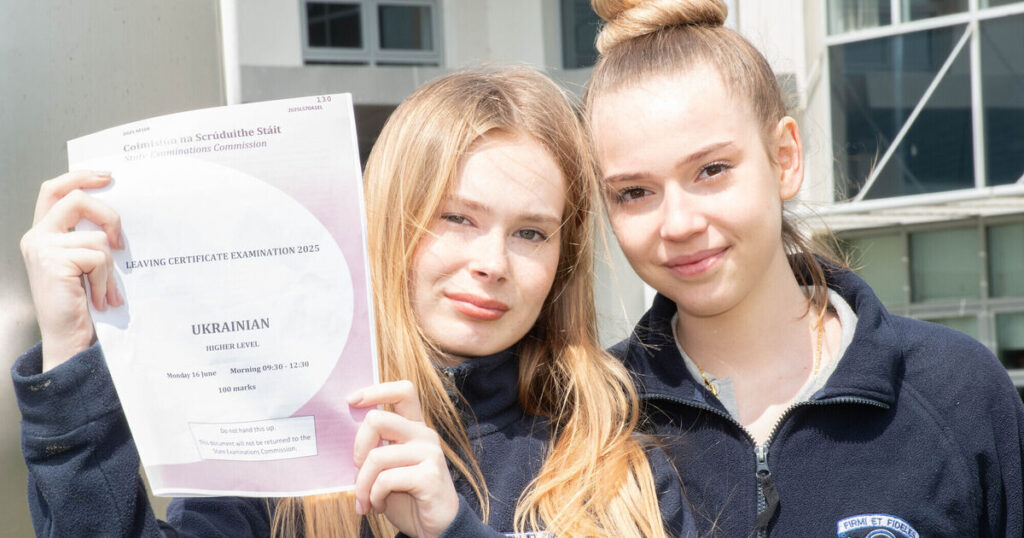An Olympic hopeful was among the inaugural students to sit the first ever Leaving Cert Ukrainian exam, in a day of mixed emotions for the students who arrived in Ireland fleeing war.
Schools across the country have welcomed thousands of students through their doors since 2022, many of whom arrived to Ireland without fluent English.
More than 570 students nationwide were entered with the State Examinations Commission (SEC) to sit the first exam in the subject, which is now recognised as a non-curricular language.
Non-curricular languages do not appear as part of the normal school curriculum but are offered to students who meet certain criteria set by the SEC.
In Youghal, East Cork, Pobalscoil na Tríonóide enrolled close to 90 students during the initial stages of Ireland’s response to the war in Ukraine.
On Monday, the school had 11 students sit the first ever Ukrainian exam. Among them was Mariia Bielik, who said:
“When we came here, no one knew English and of course, we were all worried about what we were going to do. When I first came to Pobalscoil, they were so quick in finding us supports.
“For me, it was an emotional moment to see our language included officially. We sincerely thank everyone for making it happen.”
The exam itself was far from easy, she added. “It was the first time, so we didn’t know what to expect. I actually didn’t have enough time, and I haven’t studied the Ukrainian language formally for two years.
“All this time I’ve tried to concentrate in English mostly, so sitting Ukrainian today felt like a piece of home to all of us here, in a new country that welcomed us with kindness and understanding.”
She hopes to study law here once she finishes her post-primary school studies. “If I get good grades,” she said.
Her classmate Oleksandr ‘Sasha’ Lychuk has been very happy to continue his promising swimming career, cut short in Ukraine, here in Cork.
An accomplished swimmer with Dolphin Swimming Club, he hopes to one day represent Ireland at the Olympics.
“It’s my dream, it’s my goal. Hopefully in a few years I can do it,” he said. He trained every morning before school, rising before dawn to make his training sessions.
“It was really hard at the start but now it’s kind of my life,” he said. “At 4.30am every morning, I need to go from Youghal to Cork so I wake up at 4am. I have training until 5.30am and then I need to get back to Youghal to my school, Pobalscoil.”
He joined the school two years ago. “Everything was new; The country, the language, the school, the system.”
He added: “When I first arrived, I didn’t speak any English at all. I found it really hard to understand what was happening.
“They just gave me time. It was so helpful, especially when I was swimming also. There were so many news things, it was very hard.”
Student Mariia Kuznetsova also wanted to thank her school for the help and support she received.
“When we came to Ireland, I went straight into third year which was a big challenge for me and all my friends because it was Junior Cert year,” she said.
“My school did a lot for us, they welcomed us, gave us special lectures, English lessons, always offered to help us.
“This year, I decided to try higher level English and I finally did the Leaving Cert,” she said, adding that it was “really hard”.
“I’m nervous about the result.” She now hopes to study interior architecture after her exams.
Many Ukrainian students had no time to adjust to a new language and a new system when they arrived first, she said.
“Now, we are doing Leaving Cert. I have no possibility to return to my native city in Ukraine because it is occupied by Russians. There is no way back for me, so I am really thankful.”
Varvara Kotenova was also very grateful to have Ukrainian as an exam option, although the exam was “not easy”.
“It was great to be a part of it.” She hopes now to study fine art. “I’m an artist. I have been painting since I was 11 years old and I hope to continue to do so.
“I really want to apply to MTU for the fine art course.
“Thanks to my school, my skills have improved and with the support from the kind people I have met here, I’ve been able to progress further.”
All non-curricular languages were examined on Monday as students may undertake an exam in just one language from the 16 included subjects.
This list includes Bulgarian, Czech, Latvian, and Romanian. Mandarin Chinese, Lithuanian, Polish, and Portuguese were added as curricular languages in 2020, and examined for the first time in 2022.


